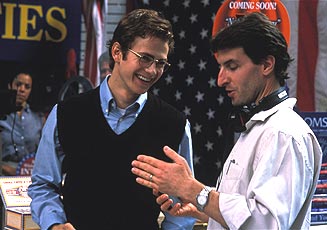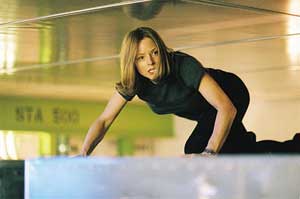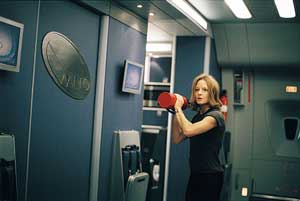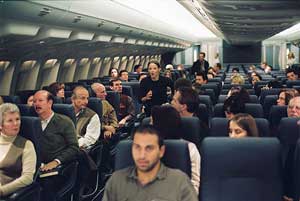 Let’s get this out of the way – this Billy Ray did not write Achey Breakey Heart. He did, however, write and direct the terrific film Shattered Glass, which proved that Hayden Christensen would be a fine whiny villain years before Episode III.
Let’s get this out of the way – this Billy Ray did not write Achey Breakey Heart. He did, however, write and direct the terrific film Shattered Glass, which proved that Hayden Christensen would be a fine whiny villain years before Episode III.
Flightplan isn’t directed by him, and it’s not his story. He stepped in to work on a previous script by Peter Dowling (look for some choice words from the original screenwriter soon enough), and made it his own. Billy Ray is exactly the kind of guy you want working on an otherwise by the numbers thriller, and it turns out he’s also exactly the kind of guy you want spending a meaty twenty minutes at your roundtable amidst the madness of the Toronto Film Festival. He’s smart and his answers come across as thought out without being canned, and he actually talks, and doesn’t just deliver soundbites.
Flightplan, directed by Robert Schwentke and starring Jodie Foster, Peter Sarsgaard and Sean Bean, opens this weekend.
Q: Peter [Sarsgaard] talked about the management of information being important in this movie. As a writer, how did you approach it? Was it from the concept of the parent/child relationship and then you built everything else around it?
Ray: Absolutely. This is a very unusual movie for me to have worked on. I tend to gravitate to true stories, or at least research-driven stories. But I read the script and at the time I read the script I had a six year old daughter – now she’s nine. I read the script and I thought, ‘Oh my God, what if I couldn’t find my daughter on an airplane?’ I’m one of those parents who if I don’t know which room my daughter is in in my own house, I get nervous and start looking around for her. So I knew I would go totally insane on that airplane. That was the start for me, that was the emotional pulse that got me going.
When I started on this script, the mechanics of the story were very different. The girl was found I think on page 80 and the story was about terrorists who were [redacted for spoilers!] bringing biological weapons into New York. That was not a movie that I wanted to write. So we had to create an entirely new scenario for what had happened to that kid and just had to start over. Everything came out of that. You start with the mechanics of the crime and then you back up the storytelling to make that crime make sense.
Q: Was it ever considered to be about a male character, a father?
Ray: When I started it was a male character, and they had been talking to Sean Penn, who I think would have been sensational. But it was Brian Grazer who had the idea of let’s make it a woman and to make it Jodie. The first draft that Jodie read, the character was a male. But she had enough insight to see how it would play with a woman and she signed on to that script and I started writing for her.
Q: What are the challenges of a script like this, where you have to spend so much time teasing the audience? You have this whole second act where you don’t want to blow your load too early.
 Ray: That is the challenge. Everything in a movie like this is the reveal. You’re trying to service so many masters when you’re writing. You’re trying to give progressive complications to your characters so that your characters are having to dig deeper and deeper and deeper to solve a problem; but you’re also trying to reveal more and more and more to your audience so they’re becoming more educated as to what that problem is, but of course without any big reveals. There were a lot of plates to spin on this one. This was a great challenge as a writer. Jodie was enormously helpful in the development of all that, and in solving those problems. She’s very smart about script, and she’s unique in my experience in terms of development because when you write for a movie star, ninety percent of the questions they have – generally – are about their character. ‘What am I doing, why am I doing it? Can I do this, it would be pretty cool. Gee, I’ve never played saxophone in a movie, that would be great. I would like to save a drowning puppy so they know I’m a good guy.’ You have those kinds of conversations, which are pretty asinine. But then you sit down with Jodie and all of her questions are about the movie as a whole. Why are other characters doing what they’re doing, and can we make the plot mechanics work better. When you get on the set, obviously things get more targeted and it’s about individual lines and individual moments, but she always – and I think it’s because she’s been doing this since she was three and she’s directed twice – but she always sees it in the big picture.
Ray: That is the challenge. Everything in a movie like this is the reveal. You’re trying to service so many masters when you’re writing. You’re trying to give progressive complications to your characters so that your characters are having to dig deeper and deeper and deeper to solve a problem; but you’re also trying to reveal more and more and more to your audience so they’re becoming more educated as to what that problem is, but of course without any big reveals. There were a lot of plates to spin on this one. This was a great challenge as a writer. Jodie was enormously helpful in the development of all that, and in solving those problems. She’s very smart about script, and she’s unique in my experience in terms of development because when you write for a movie star, ninety percent of the questions they have – generally – are about their character. ‘What am I doing, why am I doing it? Can I do this, it would be pretty cool. Gee, I’ve never played saxophone in a movie, that would be great. I would like to save a drowning puppy so they know I’m a good guy.’ You have those kinds of conversations, which are pretty asinine. But then you sit down with Jodie and all of her questions are about the movie as a whole. Why are other characters doing what they’re doing, and can we make the plot mechanics work better. When you get on the set, obviously things get more targeted and it’s about individual lines and individual moments, but she always – and I think it’s because she’s been doing this since she was three and she’s directed twice – but she always sees it in the big picture.
Q: Why were you not interested in the terrorist story?
Ray: That may be a particularly worthy movie, it just wasn’t a movie that interested me. When you sit down to write a movie, it has to be something you think you can make a comment about in some authentic, non-derivative way. I have a lot to say about 9/11, and I’m actually writing an adaptation of a book right now called 102 Minutes, for Sony, and for which I have high hopes. This, for me, was a movie that was more about our fears of flying than it was about something specific to be afraid of. I didn’t want to make a movie about terrorism on an airplane, but I did think it was very interesting to make a movie about how the second you get on an airplane, you have to start thinking about terrorism and about how that becomes the prism through which we see everything – not only on an airplane, but in an airport now. Everybody racially profiles now, the second you look around to see who is on the plane with you. That is worth comment. I am very, very proud of this movie, but one of the things I’m most proud of is the way the Arabs are treated in the movie. It’s a total mis-read and a major mis-guide in the movie, which plays on our fears.
Q: That must have been a sticky thing to write. Jodie’s character was saying that she didn’t care about political correctness, but you as the writer seemed to be balancing out the Arabs with the uninformed, prejudicial American.
Ray: I thought we should shine a little bit of a light on how people behave post-9/11. This movie has a very strong post-9/11 sensibility to me, and that was something extremely conscious of when writing it.
Q: It’s interesting – we just had Red Eye come out, and now this. You’re working on 102 Minutes and Oliver Stone has a 9/11 movie. It sort of felt like right after 9/11 the consensus was, ‘Well, that’s it, we’re never going to make a movie with explosions again.’ Then after time it became, ‘We’ll never make movies about planes again,’ now it’s all sort of turned around. Was there a moment that changed this consensus, or is it just that time’s up and we can all talk about it now?
Ray: I think time’s up. It took a while for Vietnam movies to get made and then they became acceptable. The way that news works now, I think news organizations have gotten a lot more cautious than they were in the past. Movies are going to become a very valuable tool in terms of shedding light on huge national experiences. There’s a place for anyone who wants to make a comment about 9/11 because there are so many stories that came out of it.
102 Minutes happens to be, for me, maybe the best book I’ve ever read. It was staggering, riveting, meticulous. It’s just great. It’s written by two New York Times reporters named Jim Dwyer and Kevin Flynn  based on their reporting of the event. What they’ve done is they’ve constructed a timeline of what happened inside those two towers. The movie actually never goes outside the World Trade Center complex. It’s extraordinary.
based on their reporting of the event. What they’ve done is they’ve constructed a timeline of what happened inside those two towers. The movie actually never goes outside the World Trade Center complex. It’s extraordinary.
There’s room for that, and the Oliver Stone movie, and UA93, just like there’s room for Flightplan and Red Eye. In a perfect world, yeah I wish Red Eye hadn’t come along because I hate to think there’s someone out there who thinks they’ve seen a plane movie, they don’t need to see two. I think they’re very different movies, hitting very different targets. That said, I think we have the biggest stick on the playground. We’ve got Jodie. I’d rather be the second airplane movie and have Jodie then be the first and not have her.
Q: Are you writing 102 Minutes in real time?
Ray: No. We’ve had that conversation at the studio a lot, because there was some suggestion that 102 Minutes should take 102 minutes, and I find that really cute and silly and I don’t think anything having to do with 9/11 should be gimmicky in any way. We would get slammed for that, and rightfully slammed for that.
That said, I think that a movie like that, because it jumps around inside the two towers as much as it’s going to do, I think you’ll constantly have to have these slug lines on every scene – ‘South Tower, 81st floor,’ and have a clock that tells you where you are and orients you at all times. But no, nothing cute in that movie.
Q: Given that you like things that are based in reality, and we talked about truth and having something to say, how much in Flightplan was a battle between that side of you and the side of you that had to just write an entertaining thriller?
Ray: I just put on a different hat for this movie. There’s a piece of paper that I have over my computer, and in bold letters it says, ‘What is the simple emotional journey?’ That’s what I’m mindful of. Whatever I’m writing, whether it’s a true story or not. And the simple emotional journey of this movie was so clear, and so resonant for me that was sort of the emotional pulse that was about every scene. And beyond that, what can I do? What characters can I throw at Jodie, what problems can I throw at Jodie, to make that emotionally resonant. That was the challenge.
Q: Do you approach a script differently when you’re directing, as opposed to handing it off to another writer?
Ray: Well, the thing I’m in Toronto to do, the thing I’m directing next, is a movie called Breach at Universal. It’s more limiting to write for yourself to direct because you are limited by your own talents, and mine are very narrow as a director. I have a very limited skill set. With Breach I have more handcuffs on because I’m the dummy who has to go out and shoot the things I’m writing, so I better write things I have a clue about how to shoot. With Flightplan I had none of those restraints and Rob is a more talented director than I am and can do anything. One of the things that was so clear to me while this movie was being made was how happy I was that I wasn’t directing it, since I wouldn’t have known how to do it. He set the bar very high for himself and jumped over it. I’m glad it was him and not me.
Q: Can you tell us about Breach?
Ray: Breach is about Robert Hansen, who was an FBI agent for 25 years and was spying for the Russians for the last 22. It’s about the last month before he’s captured. It’s another research-driven movie.
 Q: Is that going to end up commenting on 9/11 as well, because of the failures of the intelligence agencies?
Q: Is that going to end up commenting on 9/11 as well, because of the failures of the intelligence agencies?
Ray: Very obliquely. Very, very peripherally. You’d really have to be looking for it to see it there.
Q: CBS did a 2 part movie about him. Did you see it?
Ray: Nope.
Q: Don’t. It’s terrible.
Ray: It wouldn’t help me to see it. You try so hard in this business to be non-derivative, so putting pictures of that in my head wouldn’t help me.
Q: How do you personally respond to high stress situations?
Ray: I like to think that I would be as courageous as she is on that airplane. I doubt that I would be. In working on 102 Minutes I think a lot about what I would have done if I had been trapped in one of those offices or trapped in one of those elevators, or if I was one of those civilians who had the opportunity to save other civilians as opposed to getting the hell out of there. You have this fantasy of yourself that you would like to believe is true, that you would have done the right thing, the great noble thing. I can’t say for sure that I would have. I just don’t know. I just don’t know. It’s very possible that I would have been one of those guys in the corner weeping.
Q: You must have learned a lot about planes for this movie. How did you research it?
Ray: Robert Schwentke and I went down to LAX and were given access to a plane. I crawled around inside it – I never knew there was an attic in a plane, but I went up there. I never knew there was an avionics section of a plane but I went through it. I crawled through the cargo hold, and found out how things actually work on an airplane. That was a great treat.
Q: Do you feel safer flying now?
Ray: No. Flightplan has given me one more thing to worry about on an airplane.
Q: Are you a bad flyer?
Ray: Not a bad flyer, but we all have this universal experience on an airplane which that our lives are not in our own hands. There’s not a damn thing we can do up there. I think that’s why turbulence freaks people out, because it feels so random and uncontrollable. I’m not a particularly bad flyer, but I just kept asking myself what I would do if I couldn’t find my daughter on an airplane.
Q: Shattered Glass was about a life falling apart because of deceit. Breach sounds like it has a similar aspect. Is there a thematic connection between the films?
Ray: Yeah. I tend to write about integrity a lot. I suspect it’s because I’m afraid I don’t have any. But I tend to like movies in which moral ambiguity gives way to moral certainty. Shattered Glass is certainly that way for me. Breach is that way for me. And to be honest to you, and it sounds like a weird segue, but Flightplan is that way for me too. The brain of the movie is that you don’t know what the right thing to do is for the first half of the movie. You don’t know if Jodie is doing the right thing or if she’s creating a mess for everybody. As that goes on, that gets shed, and it becomes very clear.
Q: One thing has always interested me about screenwriters. Writers in general tend to be solitary and proprietary about their work, but screenwriters are in one of the most collaborative mediums ever. What is it that drew you to screenwriting as opposed to novels?
Ray: I love movies. I grew up on the American movies of the 70s. All the President’s Men. The Godfather. Klute. Chinatown. Butch Cassidy. Rocky. Ordinary People. Kramer vs Kramer. Great movies. Great storytelling. I just always wanted to do that.
My father was a literary agent, he represented screenwriters. One of them was Alvin Sargent, who I think is one of the five best screenwriters of all time, and when I told my dad I wanted to be a screenwriter I was 19. He brought me into his office and there were stacks of screenplays in his office. He pulled out a draft of Ordinary People and he handed it to me and said, ‘Do this.’ That’s where he set the bar, and I’ve been shooting for it ever since.
It’s of course the most collaborative art form possible, and it’s because it costs so much money. You have to learn to be collaborative as a screenwriter. You can’t sit in a café in Spain in bang it out and they publish  it. It doesn’t work that way. But if the people you’re collaborating with are smart people, they push you to do better work. That’s great.
it. It doesn’t work that way. But if the people you’re collaborating with are smart people, they push you to do better work. That’s great.
Q: Why is that in film directors walk away with the glory but in theater it’s all about the writer? Who even remembers who directed a particular Eugene O’Neill play?
Ray: Because I think people put very simple tags on things and when they describe film as a visual medium – which it is – they ignore the fact that there’s a visual component to theater as well. And because the rule of theater is that you can’t change what the writer writes, so he must be the authority. And of course that’s not the rule in film. Ultimately the ship has to have a captain, and every big decision on this movie was made by Robert. I had input and I had thoughts, but if Robert and I disagreed, it would go the way Robert wanted. Fortunately we never did, and that’s because we were partners and he treated me like a partner. But ultimately it’s his call and he will reap the glory from this, and deservedly so. He did a fantastic job.